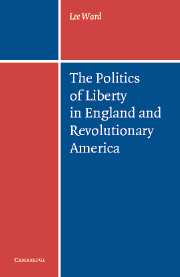Book contents
- Frontmatter
- Contents
- Acknowledgments
- Introduction: Reexamining the Roots of Anglo-American Political Thought
- PART ONE THE DIVINE RIGHT CHALLENGE TO NATURAL LIBERTY
- 1 The Attack on the Catholic Natural Law
- 2 Calvinism and Parliamentary Resistance Theory
- 3 The Problem of Grotius and Hobbes
- PART TWO THE WHIG POLITICS OF LIBERTY IN ENGLAND
- PART THREE THE WHIG LEGACY IN AMERICA
- Conclusion
- Bibliography
- Index
2 - Calvinism and Parliamentary Resistance Theory
Published online by Cambridge University Press: 28 October 2009
- Frontmatter
- Contents
- Acknowledgments
- Introduction: Reexamining the Roots of Anglo-American Political Thought
- PART ONE THE DIVINE RIGHT CHALLENGE TO NATURAL LIBERTY
- 1 The Attack on the Catholic Natural Law
- 2 Calvinism and Parliamentary Resistance Theory
- 3 The Problem of Grotius and Hobbes
- PART TWO THE WHIG POLITICS OF LIBERTY IN ENGLAND
- PART THREE THE WHIG LEGACY IN AMERICA
- Conclusion
- Bibliography
- Index
Summary
In the early 1640s England exploded into civil war. The decades'-long conflict between the supporters of Parliament and the supporters of the crown came to a dramatic test of arms. In the pamphlet war that preceded and accompanied the military contest, the disputants dealt with fundamental questions about the nature and origin of political power and the status of the monarchy in the English system of government. Filmer joined this controversy about first political principles with characteristic aplomb. In The Anarchy of a Limited Monarchy he offered a comprehensive critique of the theoretical foundations of the parliamentary position propounded in the influential works of Philip Hunton and Henry Parker. It is in this attack on the parliamentary contractarianism of the civil war era that Filmer presented his fullest articulation of the divine right theory of absolute sovereignty.
Filmer joined the fray not only to defend the rights and privileges of his sovereign, Charles I, but also to counter what he took to be the noxious doctrine of mixed monarchy that underpinned the parliamentary cause in the war. He identified the intellectual foundations of the parliamentary position in the potent combination of Calvinist resistance theory and the English notion of ancient constitutionalism. In the mixture of theological and secular arguments that animated the apologists of Parliament, Filmer perceived dangerous doctrines that justified resistance to the crown and denied the legal and constitutional supremacy of the monarch.
- Type
- Chapter
- Information
- Publisher: Cambridge University PressPrint publication year: 2004



